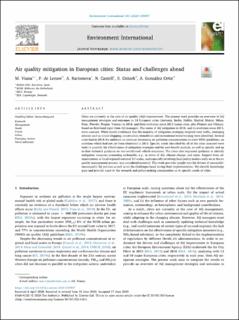| dc.description.abstract | Cities are currently at the core of air quality (AQ) improvement. The present work provides an overview of AQ management strategies and outcomes in 10 European cities (Antwerp, Berlin, Dublin, Madrid, Malmö, Milan, Paris, Plovdiv, Prague, Vienna) in 2018, and their evolution since 2013 (same cities, plus Ploiesti and Vilnius), based on first-hand input from AQ managers. The status of AQ mitigation in 2018, and its evolution since 2013, were assessed. While results evidenced that the majority of mitigation strategies targeted road traffic, emerging sources such as inland shipping, construction/demolition and recreational wood burning were identified. Several cities had in 2018 the ambition to continue decreasing air pollution concentrations to meet WHO guidelines, an ambition which had not yet been identified in 2013. Specific needs identified by all of the cities assessed were tools to quantify the effectiveness of mitigation strategies and for cost-benefit analysis, as well as specific and up to date technical guidance on real-world road vehicle emissions. The cities also requested guidance to identify mitigation measures promoting co-benefits, e.g., in terms of AQ, climate change, and noise. Support from administrations at local-regional-national-EU scales, and especially involving local policy-makers early on in the air quality management process, was considered essential. This work provides insight into the drivers of successful/unsuccessful AQ policies as well as on the challenges faced during their implementation. We identify knowledge gaps and provide input to the research and policy-making communities as to specific needs of cities. | en_US |

